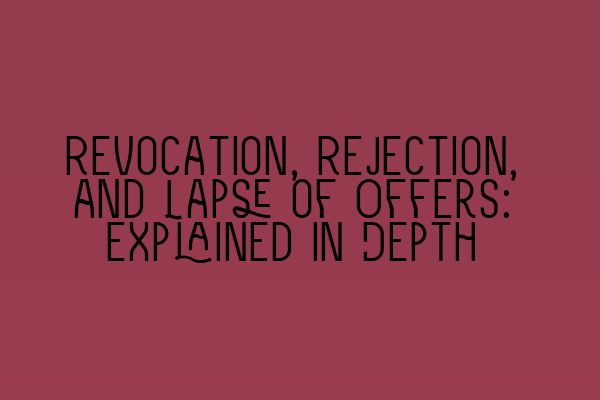Revocation, Rejection, and Lapse of Offers: Explained in Depth
When it comes to contract law, offers are an essential element in the formation of a legally binding agreement. However, offers are not set in stone. They can be revoked, rejected, or simply lapse over time. In this in-depth guide, we will delve into the intricacies of revocation, rejection, and lapse of offers in contract law. By understanding these concepts, you can navigate the complexities of contract negotiations with confidence.
Revocation of Offers
Revocation occurs when the offeror (the party making the offer) withdraws their offer before it is accepted by the offeree (the party receiving the offer). It is important to note that an offer can only be revoked if it has not yet been accepted. Once an offer has been accepted, it becomes a binding contract.
The revocation of an offer can be express or implied. Express revocation refers to the direct communication to the offeree that the offer is no longer valid. This can be done through various means, such as in person, by phone, or in writing. Implied revocation, on the other hand, occurs when the offeror takes action inconsistent with the continuation of the offer. For example, if the offeror sells the item that was the subject of the offer to someone else, it implies that the offer is no longer available.
It is important to note that for revocation to be effective, it must be communicated to the offeree before they accept the offer. If the offeree is unaware of the revocation and accepts the offer, a contract is formed.
To learn more about frustration in contract law and its impact on contractual obligations, read our article on Exploring the Impact of Frustration on Contractual Obligations: Legal Insights.
Rejection of Offers
Rejection occurs when the offeree declines the offer, either explicitly or implicitly. Like revocation, rejection must be communicated to the offeror for it to be effective. Once an offer is rejected, it is no longer available for acceptance, and the offeree cannot later change their mind and accept the offer.
It is important to note that a counteroffer is not a rejection. A counteroffer occurs when the offeree proposes different terms or conditions to the original offer. In this case, the original offer remains open until the offeror accepts or rejects the counteroffer.
To gain a better understanding of contractual clauses and unlock their hidden meanings, read our article on Interpreting Contractual Clauses: Unlocking the Hidden Meanings.
Lapse of Offers
An offer can also lapse over time if certain conditions are not met. The most common ways an offer can lapse include:
- Expiration of Time: If the offer specifies a deadline for acceptance, the offer automatically lapses if the offeree does not accept within the specified timeframe. If no timeframe is specified, the offer may lapse after a reasonable period of time.
- Death or Incapacity: If either the offeror or the offeree dies or becomes legally incapacitated before the offer is accepted, the offer lapses.
- Subsequent Illegality: If the subject matter or purpose of the offer becomes illegal after the offer is made but before it is accepted, the offer lapses.
It is important to note that an offer can also be terminated by the operation of law. This occurs in situations such as destruction of the subject matter, death of a party, or supervening frustration of the contract.
To gain insights into the key considerations for entrepreneurs regarding legal aspects of business contracts, read our article on Legal Aspects of Business Contracts: Key Considerations for Entrepreneurs.
In conclusion, understanding the concepts of revocation, rejection, and lapse of offers is crucial in contract law. Knowing when an offer can be revoked, how rejection works, and the circumstances that can cause an offer to lapse can help you navigate contract negotiations effectively. By staying informed and seeking legal advice when needed, you can ensure that your contracts are legally binding and protect your interests.
To learn more about the various types of agreements in contract law, read our article on Agreements in Contract Law: Understanding Its Various Types.
Additionally, if you want to understand the basis of contractual exchange, consider reading our article on Essentials of Consideration: Understanding the Basis of Contractual Exchange.
